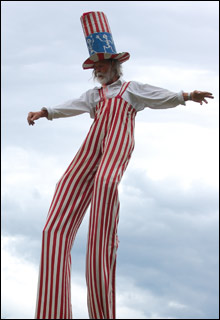Bread and Puppet Theater founder Peter Schumann is a national treasure. Maybe that’s why George W. Bush wants to bury him.
By GREG COOK | October 16, 2008

DADDY LONG LEGS: Peter Schumann, 74,
is the father/founder of Bread and Puppet
Theater, and is one of America’s greatest
living artists |
Nestled in the verdant mountain valley of Glover, Vermont, way up in the northern part of the state, is a farm of rolling meadows, pine forests, and gray barns, all under vast skies. It’s the home base of Bread and Puppet Theater, the landmark political troupe that has been pricking US presidents and policies with a unique brand of street theater since John F. Kennedy was in office. The theater has been resurgent since George W. Bush took the reigns in 2000, so I ask founder Peter Schumann, now that the ghastly Bush era is mercifully lurching to its end, what’s next? “To protest the new era that’s coming after the Bush era,” he says in his native German accent, “which is the same era as the Bush era.”Schumann warns of a continuing era of gluttonous, bullying American consumerism, no matter who sits in the Oval Office. “It’s the sad late stages of this form of capitalism that can’t possibly be longer with us,” he says. “That will kill us for sure. . . . It just doesn’t work.” And he dismisses the notion that the advisors to a potential Barack Obama administration would be much different: “The same old mass murderers that were responsible for incredible events in this world like East Timor or the starvation of the Iraqis during the [’90s] blockade.”
Such fiery rhetoric is evidence of the continuing radicalism of a theater born in New York in 1962, when the fledgling experimental troupe made its name protesting the Vietnam War with papier-mâché masks and giant puppets. Many imagine that’s where the theater ended. Others know it’s still active, but write it off as a quaint hippie relic.
Perhaps that’s because Bread and Puppet pulled itself off the art world’s radar by relocating to Vermont in 1970, far from major theaters and galleries. It pursued a rigorous but populist “cheap art,” the most magnificent expression of which was an annual epic outdoor summer pageant featuring casts of hundreds and audiences of tens of thousands at the Glover farm. This single giant weekend extravaganza was discontinued in 1998 — the crowds grew unmanageable and that year a man was killed in a fight — but since then, the theater has presented an annual series of smaller shows on summer weekends. Many in New England grew up seeing the performances, but often, upon reaching adulthood, came to dismiss them as fluff for children.
 Topics
Topics:
Lifestyle Features
, Barack Obama, Culture and Lifestyle, George W. Bush, More  , Barack Obama, Culture and Lifestyle, George W. Bush, Hobbies and Pastimes, John F. Kennedy, Brown University, Protests and Demonstrations, Arts and Crafts, Julie Taymor, Peter Schumann, Less
, Barack Obama, Culture and Lifestyle, George W. Bush, Hobbies and Pastimes, John F. Kennedy, Brown University, Protests and Demonstrations, Arts and Crafts, Julie Taymor, Peter Schumann, Less 